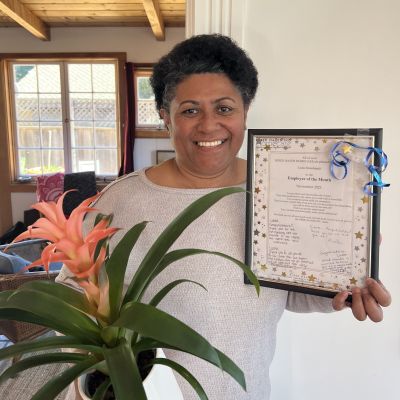Breaking Free From Caregiver Guilt Starts With One Small Step


Letting go of caregiver guilt opens the door to peace, balance, and renewed strength.
If you’ve ever said, “I’ll handle that once Mom’s settled,” or “There’s just no time for me right now,” you’re not alone. Nearly every family caregiver has been there — caught in the trap of self-sacrifice and caregiver guilt. It feels noble to put your needs last. After all, someone you love depends on you.
But here’s the truth: when you run yourself into the ground, nobody wins. Your patience, energy, and health form the foundation of the care you give. When those start to crack, your ability to support the person you love begins to crumble too.
Knowing that doesn’t make it easy, of course. You might feel selfish for taking time off, uncomfortable asking for help, or anxious that you’re not doing enough. But taking care of yourself isn’t neglect; it’s protection. It ensures that both you and your loved one can keep going strong.
Here’s how to start shifting the way you think about self-care — and why it’s one of the kindest things you can do for both of you.
Redefine What “Self-Care” Really Means
Self-care isn’t all candlelight and spa music. Sure, that sounds nice, but real self-care often happens in the smallest, most practical ways — eating a proper meal instead of grabbing a handful of pretzels, turning in early for once, or calling a friend just to talk about something other than caregiving.
Try reframing it as maintenance. You wouldn’t expect your car to run without oil or gas, and you can’t expect your body to function on empty, either. Those small, daily acts — a stretch, a pause, a laugh — keep your system running smoothly.
And here’s the best part: caring for yourself doesn’t take anything away from your loved one’s care. It enhances it. A calmer, more energized caregiver gives better, steadier, more patient care.
Let Go of Caregiver Guilt and Lean Into Gratitude
Every caregiver knows that little voice that says, “I shouldn’t be resting right now.” But guilt doesn’t make you a better caregiver; it just makes you tired.
When guilt shows up — and it will — swap it out for gratitude. Instead of thinking, “I shouldn’t take a break,” say, “I’m grateful for this moment to recharge so I can keep giving my best.”
This mindset shift changes everything. You’re not stepping away from your role; you’re strengthening it. Remember, guilt isn’t proof of love. Love is choosing to stay healthy enough to keep showing up day after day.
Ask for Help — and Mean It
If you’ve been doing this alone, you’re in good company. Caregivers are notorious for helping everyone else but hesitating to ask for help themselves. Maybe you worry about being a burden, or you tell yourself it’s easier to just do it all. But that’s not sustainable.
The truth is, most people want to help; they just don’t know how. Be specific: “Could you stay with Dad for an hour while I run errands?” or “Would you mind bringing dinner next Thursday?” Clear requests make it easier for others to say yes.
And when it comes to professional help, think of it as partnership, not replacement. Home care services exist to support both you and your loved one, not to take your place.
Listen When Your Body Speaks
Your body keeps score, even when your mind insists it’s fine. The headaches, fatigue, irritability, or forgetfulness that creep in are signals that you’re running low.
Pay attention to those early warnings. Drink water before you’re thirsty. Step outside for a few deep breaths. Schedule your own doctor visits and actually keep them. These small steps don’t require extra time; just permission.
Perfection isn’t the goal. Presence is. And you can’t be truly present if your body and mind are running on fumes.
Treat Rest as a Responsibility
Caregiving can feel like a 24/7 job, but that doesn’t mean you don’t deserve time off. In fact, regular rest should be non-negotiable. Even brief pauses — a cup of coffee in silence, a quick nap, a walk around the block — can lower stress and bring your focus back into balance.
When possible, plan for respite care or create a rotating schedule with family members so you can take predictable breaks. A few hours of rest now prevents days or weeks of exhaustion later.
Your loved one needs you steady, not stretched thin.
Find Strength in Shared Stories
One of the best ways to refill your emotional tank is by connecting with others who understand. Whether it’s a support group, an online forum, or simply a trusted friend, talking about your experience helps you process it.
You may be the one offering care, but you also deserve care. Community creates perspective — a reminder that you’re not alone in this, and that it’s okay to lean on others just as they lean on you.
Love, Care, and Balance Can Coexist
At its core, caregiving is about love. But love thrives in balance, not burnout. The goal isn’t to be everything to everyone — it’s to make sure you and your loved one can both experience comfort, connection, and moments of joy.
So take the walk. Book the checkup. Accept the meal. You deserve rest just as much as your loved one deserves care. The better you feel, the stronger your love becomes.
Let Hired Hands Homecare Help You Breathe Easier
We know the heart and the weight of caregiving, and we’re here to help you carry both. Our compassionate, experienced caregivers provide reliable in-home support so you can rest, recharge, and care for yourself without worry.
Serving families across Petaluma, Novato, San Rafael, and throughout the Bay Area, we’re honored to give family caregivers the time and peace of mind they need to stay healthy and hopeful.
Call (866) 940-4343 to learn how we can help you find balance, strength, and comfort — for yourself and the one you love.








Leave a Reply